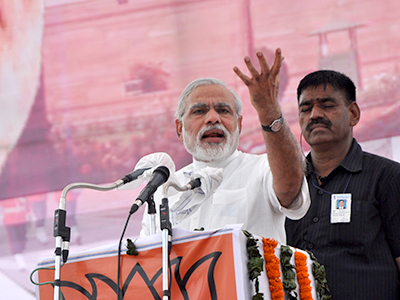Experienced Investor
Modi win: Is now the time to invest in India?

Much has been written about the impact of the Indian election on the nation’s stock market. But how will the outcome affect foreign investors in the long term?
Last week opposition leader Narendra Modi and his Bharatiya Janata Party (BJP) swept to victory in the Indian general election.
Immediately after the result the BSE Sensex index shot up 3.4 per cent to reach a 10-month high of 25,376. In addition, the rupee rose 0.9 per cent against the dollar.
The win marks the first time in 30 years that the party in power has come with a full majority in the lower house of the legislature, and investors are hoping that Modi can revolutionise the Indian economy the way he streamlined the state of Gujurat when he ruled there.
However, Modi rode to power largely on the back of slogans and dissatisfaction with the corruption-riddled Congress Party. So, with very few actual policies announced, how much hope should investors have for this brave new regime?
Cleaning House

Wellness and wellbeing holidays: Travel insurance is essential for your peace of mind
Out of the pandemic lockdowns, there’s a greater emphasis on wellbeing and wellness, with
Sponsored by Post Office
According to Andrew Swan, who manages the Asia and Asia Special Situations funds at BlackRock, infrastructure in India has lagged in terms of development. Major projects in power, transport and communications have all stalled due to corruption or poor implementation.
Modi, he says, now has the mandate to implement significant reforms in this area.
Swan expects the government to tackle corruption, approve some key projects which have stalled at the regulatory phase and start work on approval of the Goods and Services tax, which will increase the efficiency of government taxation.”
Ajay Argal, manager of the Baring India fund, says Modi’s previous success stands him in good stead: “In India it is all about how to get the parties together to get things done. Big projects often get delayed by squabbling between ministries, but at least in Gujurat Modi has shown that he can make a consensus and get projects running.”
Will the rally continue?
According to Swan, the recent stock market rally has staying power. He believes that with reform and successful implementation there is every chance that equity valuations – which currently sit around 16 times price to earnings – could rise to 20.
He says: “The election has the potential to change the landscape for investing in India for the foreseeable future. As with everything, time will tell, but the new government has the potential to significantly change the economic outlook for India over the medium-to-long term.
Argal, meanwhile, says the slowdown in India in recent years, unlike the economic issues experienced by other nations, was related to country-specific factors.
If Modi can successfully implement his reforms, he believes India could return to the glory days of its economy, where it experienced growth four or five per cent higher than other economies.
Riding the wave
If Modi can revolutionise the Indian economy, foreign investors can ride the wave of prosperity by investing in the sectors that stand to benefit most.
According to Argal, the banking and industrial sectors should do well should Modi succeed.
Indeed, on the announcement of his victory Indian Banks such as Canara Bank and ICICI Bank led the rally, their stocks rising by as much as seven per cent.
Craig Botham, an emerging market economist at Schroders, thinks that the consumer market could also see a major boon in the medium to long term.
Unlike China, India has a burgeoning workforce and a young population.
Putting the 1.27 billion strong, largely unskilled population to work by removing the bureaucratic obstructions that have so far prevented India’s rise as a cheap manufacturing centre could create a massive middle class with enormous spending power, he says.
“If India can get its manufacturing together, that could be a major boon to the West,” he adds.
Swan, meanwhile, has switched his focus from India’s exporters to domestic companies which have the potential to grow in an improving economic climate.
He says: “This could be aided by the strengthening of the Indian rupee which will increase the returns to the investor denominated in US dollars.”
Proceed with caution
Despite the swelling optimism surrounding India, there are reasons for investors to proceed carefully.
According to Argal, the federal structure of India means that state governments could still disrupt Modi’s big plans, as could opposition parties that control the top house of the legislature.
“It all depends on how the stakeholders at the state level contribute to his vision,” he explains.
Swan agrees, noting that India is large and notoriously difficult to manage.
Implementation of reform will be key, he says, and investors should be mindful of how successfully the new government is when it comes to actually implementing policy.
Botham says: “People are confident about the new government because Modi accomplished in Gujurat much of what is needed by India as a whole. But we do wonder whether doing it at a state level will necessarily translate into being able to do it at a national level.”